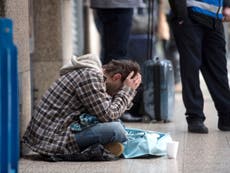As politicians bickered this week, a homeless man died outside parliament – and the sad thing is Brexit could make the situation worse
If another recession comes we need to be ready with effective policies in place to protect the most vulnerable, or thousands more will suffer needlessly and hundreds will quite simply die

This week, as Jacob Rees-Mogg reckoned with the humiliating realisation that some berk with a glorified radio-controlled plane had curtailed freedom of movement more quickly and effectively than he ever could, our marginally more reasonable parliamentarians retired to their constituency homes to consider whether they should opt for the version of Brexit that’s forecast to shrink the economy by 3.9 per cent or the version that’s forecast to shrink the economy by 9.3 per cent.
They’re just numbers though, aren’t they? I don’t really have a sense of what they mean, any more than I know what it means when the wearily named Office for Budget Responsibility tells us that the prime minister’s deal will leave Britain £15bn a year worse off by the early 2020s. Nothing but vague and boring abstractions, best left to the most tiresome of experts.
That is, until a 43-year-old homeless man has the gall to die at the gates of parliament, and I think: oh – it’s that sort of thing, isn’t it? That’s the sort of thing that happens when the big numbers get smaller, and that’s the sort of thing that’s a bit harder to politely ignore.
Look, I don’t want to parlay one man’s tragic circumstances into a rant about British politics in 2018, as utterly bonkers as the whole thing looks to me. For all the bleak symbolism of a man dying right outside parliament, the fact is that we have long-standing issues with homelessness across the country that we’ve never really got to grips with; there have always been people shut out and in grave danger. This is a growing issue for many of our European neighbours too. And given that we’ve had recessions at regular intervals throughout our history, anyone with an ounce of foresight must anticipate that we’ll have another – if not next year with Brexit, then a bit later for some other reason, and then again a while after that.
Whenever the next one comes, we need to be ready with effective policies in place to protect the most vulnerable, or thousands more will suffer needlessly and hundreds will quite simply die.
Tell me if this sounds “ready” to you: last year, the national homelessness charity Shelter published figures obtained from official government sources which showed that over 300,000 people in the UK were without a permanent home.
That’s about 1 in every 200 people. In London, the number rises to 1 in 59. Yesterday, the Office for National Statistics confirmed that deaths of homeless people have risen by 24 per cent in the last five years, with 597 deaths in 2017 alone.
And right now, we aren’t even in a recession. It doesn’t take a genius to figure out which direction things will go in when the next one arrives.
Hope comes, as it so often does, from looking outward. To Finland, in this case, whose “housing first” programme has made them the only country in Europe where homelessness is decreasing. The basic principle couldn’t be simpler: that everybody needs a permanent home, and that having that stable base gives people the best possible chance to address the issues that lead to homelessness in the first place, whether those issues relate to joblessness, loss of a privately rented home, addiction, mental illness, or anything else.
Seems incredibly obvious, doesn’t it? And yet, as parliament’s Communities and Local Government Committee reported as recently as 2015, a homeless person had to show that they were more vulnerable than “an ordinary street homeless person” for their local housing authority to fall under any obligation to house them at all – as if the average rough sleeper needed nothing more than a chat and a pamphlet to sort themselves out.
While parliament has since passed legislation in the shape of the Homelessness Reduction Act of 2017, which extended the duty of local housing authorities to prevent and relieve homelessness, the same 2015 report stopped short of recommending a housing-first strategy “because of the severity of England’s homelessness challenge and the scarcity of funding and of social housing”.
Nobody can argue with the need to address our shortage of social housing, but I must say that it seems more than faintly perverse to invoke the gravity of our issues with homelessness as a reason to shy away from one of the very few homelessness strategies with a recent track record of success. With the Local Government Association estimating that councils will be facing a funding shortfall of nearly £8bn by 2025, you have to wonder whether the political will is really there to do more than tinker at the margins.
Bluntly, this is on all of us: you, me and the European Research Group. As we soothe ourselves and each other through these long, dark and bone-piercingly cold nights with love and a baffling array of fortified wines, as the truly virtuous among us start to parboil next week’s sprouts, and as I tap out my column under a soft blanket in my cosy home, I am earnestly inviting you to ask yourselves: are we really doing everything we can? When the next winter sets in, will we be able to say that we’re taking better care than we are right now of those who need it the most?
None of us can fix this on our own, and we can’t expect the political class to do it for us while we walk on by. A humble suggestion then: let’s all think about how we might be a small part of the solution. That might mean volunteering our time or donating to homeless charities, spending an hour here and there researching the issues and solutions to get a better understanding of where we are, or putting pressure on our representatives to make this a top priority and making it clear that that’s a condition of securing our votes.
Let’s not kid ourselves about the size of the task, but let’s join in and help. In a few years, who knows? Perhaps we might be better placed to say without the faint whiff of hypocrisy catching in our throats: “Happy Christmas to all, and to all a good night…”





Join our commenting forum
Join thought-provoking conversations, follow other Independent readers and see their replies